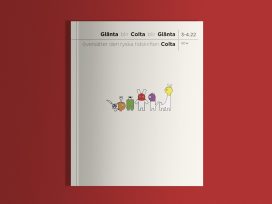Editorial to Glänta 2–3/2017
When the editorial team of Glänta visited Beirut last March, we, at Bidayat, were very happy to meet with them and welcomed with enthusiasm and lots of excitement their suggestion to work on a project together. This special issue is the first outcome of this collaboration. We are thus thrilled to introduce Bidayat to the Swedish reading public with this distinctive collection of articles and photo essays curated from the magazine’s different sections and recapturing in essence the spirit of Bidayat – or ‘Beginnings’.
2011 was the point in time when it all started, when people across the Arab World took to the streets calling for work, freedom, social justice and human dignity from Tunisia, to Egypt, Yemen, Libya, Morocco, Bahrain and Syria. As Arab societies rose against their rulers, we found ourselves eager to accompany these popular uprisings and contribute to the renewal of hope and the bringing about of imminent and fundamental change in both state and society. And so was the idea of this magazine, Bidayat – its subtitle ‘for all seasons of change’, a committed Arabic quarterly – first launched in 2012, shortly after the Arab uprisings. More than six years later, in the aftermath of uprisings, revolutions, counter-revolutions, civil wars and reactionary encounters, the endeavour to understand the magnitude and the significance of the historical opportunities that presented themselves continues.
Progressive forces in the Arab World today are caught in a perplexing situation. The challenges are countless: the persistence of despotic regimes, foreign interventions, mass scale destruction and humanitarian disasters, and the forsaking of democracy and social justice in the name of anti-colonialism and anti-imperialism. But, as events are still unfolding, we believe that the future holds surprising openness. The readiness for the coming period of transformations and the possibility of progressive politics will depend vastly on people’s ability to learn from the past, and to understand the present. The Arab uprisings already revealed that people stood against neoliberal policies; that they claimed their right to be the source of power; and strived to place social justice at the heart of the democratic process.
Conceived as a critical cultural and intellectual platform in Arabic, with women and men collaborators from all around the Arab world, Bidayat is aimed at a general readership yet keen at maintaining academic standards and engaging with emerging, young generations of Arab activists, writers, artists and journalists. More importantly, the magazine seeks to make a significant contribution to these on-going struggles of Arab societies towards self-determination, democracy, secularism, social and economic justice, guided by values of equality, freedom and humanism and recognising ethnic, gender and cultural diversity.
While traditional journalism and new media are increasingly geared towards publishing short and fast-tracked analyses and op-eds, Bidayat strives to bring forward long form essays and rigorous and provoking thought pieces. It also makes every effort to give voice to topics and themes that are often neglected in other publications and obliterated by global and local politics of knowledge production. The publication translates a vast array of contributions from the rich intellectual production on the region by the new generation of Arab and non-Arab academics outside the region. It offers critical and novel reflection on the question of memory and historiography, featuring previously unpublished articles and private papers, memoirs, testimonies, oral history recordings, diaries, as well as official and government archives.
In line with its political commitments, Bidayat contrives to give ample space to study the impact of neoliberalism on the economies, societies, states and culture in the Arab World. It seeks to follow and impact movements of resistance with the will to contribute to the growing momentum for comprehensive and radical change and to build forces needed for new mass politics. Combining professional journalism with audacious creativity in design and layout, the magazine is aesthetically daring and does not shy away from continuously bringing to light subversive and oppositional artistic contributions ranging from visual arts and the culture of looking to folklore and popular culture.
And so it is with joy that we present to you here Sahar Mandour, Bushra Al Maqtari, Rana Zeid and Asmaa El Ghoul writing on revolutions, uprisings and wars from Egypt, Yemen, Syria and Palestine; as well as an insightful thought piece by Fawwaz Traboulsi on the history of aerial bombings. As Bidayat encourages women and men to write on all topics, including gender issues, Hind Al Aryani addresses child marriage in Yemen; Mayssoun Sukarieh studies representations of the ‘Arab First Lady’ in Western journalism; and Zeinab Srour and Maryam Hammoud weave prose with politics in two creative and intimately personal essays. In art and music, we chose to include enticing photo essays from the uprisings and from Syrian photographer Muzaffar Salman on Aleppo; a piece by John Berger on the work of Syrian artist Randa Maddah; a fresh and critical outlook on graffiti artist Ali Rafei in Lebanon; a contribution from Nawal Traboulsi on Palestinian postal stamps; and a piece by Ziad Dallal on Arabic hip hop.
Last but not least, from our section on memory and historiography, and we conclude with Etel Adnan’s captivating recalling of the end of the Ottoman Empire; and Abdel Fattah Kilito who, in a wordplay on James Joyce’s famous novel, revisits Edward Said’s legacy and wittingly sketches a Portrait of the intellectual as a porter.
Sahar Mandour, from both Egypt and Lebanon, is a member of the editorial board of Bidayat, a journalist, novelist and feminist activist. Her text, written in Sahar’s distinctive style, is quite representative of young, feminist writings in the Arab World.
Aziz al-Azmeh, Syria, is an academic and historian of late antiquity. He has produced a number of precious contributions on the birth of Islam, Islam and Secularism and Islam and modernities. The interview we chose resumes aspects of his reflections on political Islamic movements. In this issue we have chosen two relevant contributions on Islam – in contrast to rationalist and secularist al-Azmeh, we also present revolutionary and social Islamic thoughts in the writings of Ali Shariati.
Elias Khoury and Jad Tabet, a noted novelist and an architect-urbanist (presently the president of the Syndicate of Architects in Lebanon) ‘compare notes’, on their long experience, knowledge and love of the city of Beirut, in war, reconstruction, fiction and imagination.
In presenting a choice of his texts, we are contributing to a better knowledge of Ahmad Faris al-Shidyaq, Lebanese man of letters, author of the first modern Arabic novel, journalist, phililogist, translator of the Bible, social critic, and, in many ways, the ‘enfant terrible’ of the Nahda, the Renaissance of Arabic culture in nineteenth century. We chose Muhammad al-Hujayri’s piece on Kuchuk Hanem – an Egyptian alema who figures in Gustave Flaubert’s travel memoirs on Egypt – as part of our interest in all aspects of popular culture, including Arabic/oriental dance.
Finally, we would like to thank the Glänta collective for presenting us with this opportunity. We hope that readers will enjoy this issue of Bidayat and we look forward not only to our forthcoming visit to Sweden to celebrate the publication of Bidayat in Swedish but also to the publication of Glänta in Arabic.
/Bidayat
Published 6 December 2017
Original in Arabic
First published by Glänta 2–3/2017 (Swedish version); Eurozine (English version)
Contributed by Glänta © Bidayat / Glänta / Eurozine
PDF/PRINTNewsletter
Subscribe to know what’s worth thinking about.



